#but jacobanism is about fearing the watcher
Explore tagged Tumblr posts
Text
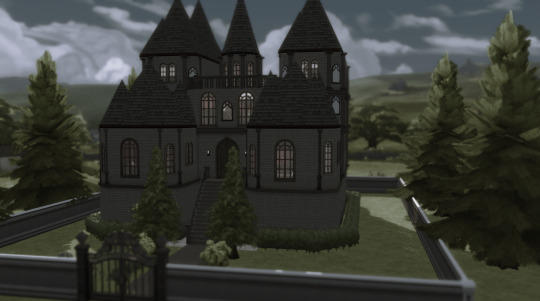

The Goth Mansion towered over Pendula View like a dark cloud. Somehow the Goths had convinved Pendites that they were the chosen ones who were always meant to rule the country, and one day, the world. Which is why they deserved this montrous mansion while most people lived in squalor.
The luxuries of the outside world were not forbidden from the Goths. Jewels, cars, foods. Even their young son, Alexander, wore clothes worth more than people's homes. Keeping Pendites poor, ignorant, and isolated was the key that allowed the Goths to maintain power.
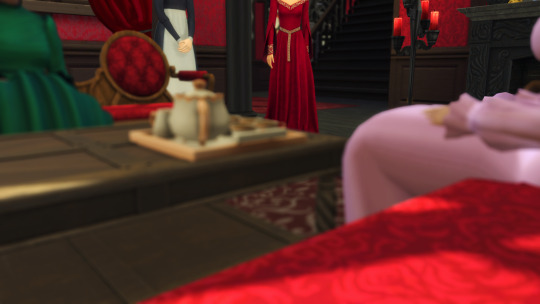
???: Sorry, I'm late, ladies. I wasn't sure if I felt like engaging with you today. But, I'm feeling generous, so figured I can grace you both with my presence.
???: No worries, at all, Your Almighty Excellency. We don't mind waiting.
???: Yes, and we weren't waiting long! The tea is still somewhat warm.
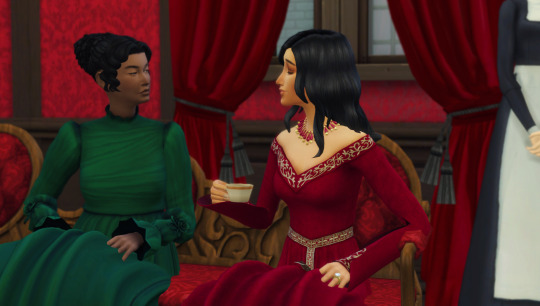
Bella: Excellent. So what utter nonsense is going on today, Lady Westbrook?
Sawyer: Um, well. We were certainly glad to hear that your spirits are well enough to meet with us considering...
Bella: Considering what? What's she talking about, Mary?
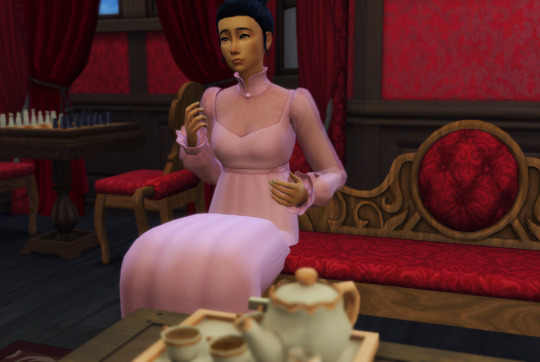
Mary: Oh, you haven't heard, Madam?
Bella annoyed: Heard of what? Watcher, get on with it.
Mary: Well...
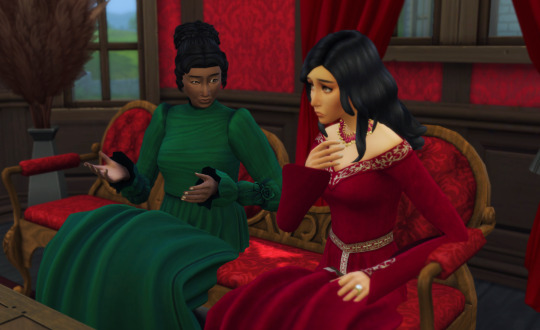
Sawyer: There's been a lot of talk lately about some prophet who's gotten the townspeople's interest. Lady Everett heard her maids talking about him.
Mary: Yes, it's caused a bit of an... upset in the ton. People are getting worried....
Bella: Worried about?
Mary: Well...

Sawyer: Worried that you and your husband are loosing control. We're sure you aren't the ones who are allowing the help to worship some other entity so deeply.
Mary: Is this the first you're hearing of this, madam?
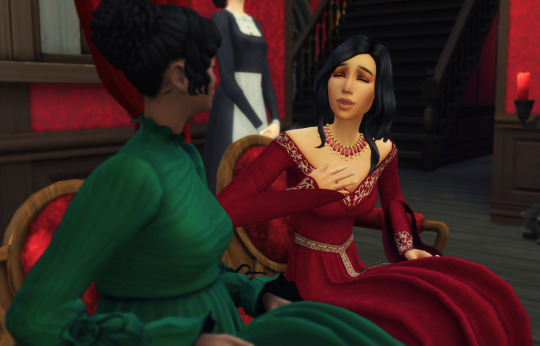
Bella: Ha! Of course not! Don't be ridiculous. I am all knowing. I just didn't think this small of an issue would draw concern from the likes of you. Or the ton. I mean, do I look like I have time to concern myself with the coming and goings of common people?
Mary: Well, no-
Bella: Of course not! Do you believe my husband and I are not capable rulers of Pendula View?
Sawyer: No, no. Of coure not, Madam!
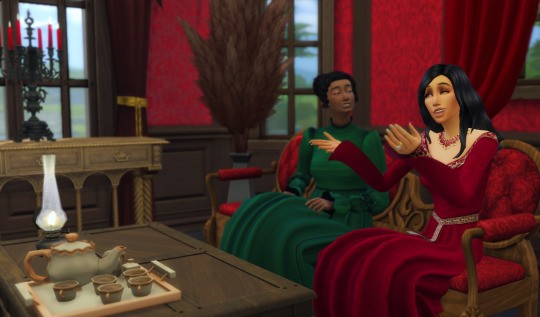
Bella: Good. I'd hate to have you forcibly removed from my home, your lady-in-waiting titles revoked, and your families exhiled.
Scared awkward silence
Bella: What a chore. Now, don't we have far more important things to discuss than the peasants?
Mary: We could talk about Lady Katherine's hideous green dress at your last event-
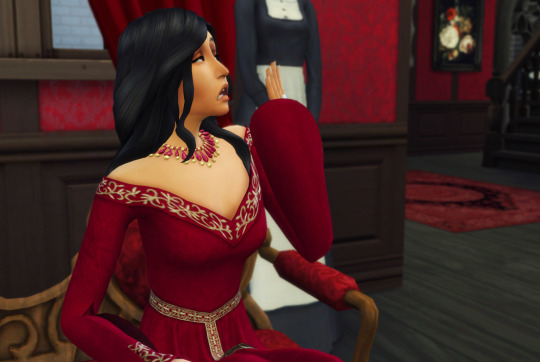
Bella "yawns": I've grown tired of this extraordinarily boring conversation. Sorry, ladies. I've suddenly remembered I have much more fascinating things to do today. See yourselves out.

beginning | previous | next
#from the beginning#sims of color#sims 4 story#sims 4 gameplay#ts4#royal sims#royal simblr#sooo bella seems pleasant lol#the wealhy are concerned about jacobanism#folks just have an agnostic belief in the watcher#but jacobanism is about fearing the watcher#its much more involved#and you know only the goths can be feared around here!
22 notes
·
View notes
Text


Thomas, King of Whitmore (1787-1855)
In 1807, a devastating disease known as Pig Death claimed many lives, including that of Thomas’s beloved parents, leaving him grief-stricken and burdened with the new responsibility as Earl of Bridemond. At a young age, Thomas found himself overwhelmed in sorrow following the tragic loss of his parents. In his quest for solace and a reason to move forward, he encountered a Jacoban priest, a figure radiating calming wisdom and compassion. Intrigued by the priest's invitation to attend one of the sermons, Thomas decided to try it, hoping to find some of peace to help him navigate his grief.
As the months unfolded, Thomas became a regular at the sermons, which drew him deeper into the teachings and warmth of the Jacoban faith. The atmosphere during these gatherings was charged with reverence and hope, and Thomas felt an undeniable connection to the enigmatic figure known as the Watcher. This connection blossomed into something profoundly transformative when, during one particularly moving sermon, the priest invoked the Watcher’s blessing upon him. At that moment, Thomas felt a surge of healing energy wash over him as if the Watcher's touch had rekindled the light within his spirit.
This deeply personal experience ultimately led Thomas to make a pivotal decision: to convert from his former Peteran beliefs to the Jacoban faith, embracing a new path that promised healing, community, and a renewed sense of purpose in a world that had once felt so dark and unforgiving.
Thomas's Journal Entry August 23, 1807:

Journal Entry Translated:
"For the first time since the heartbreaking loss of Mama and Papa, a flicker of hope begins to illuminate my life, breaking through the shadows of despair. Attending the Jacoban sermons, with their powerful words and uplifting messages, has reignited a sense of purpose within me that I feared had vanished forever. Each gathering feels like a balm for my soul, filling me with inspiration and warmth. The atmosphere is charged with a communal spirit, reminding me that there is still a path forward, even amid the weight of my grief.
Yet, despite this newfound hope, a heavy cloud of concern hangs over me. So many people harbor deep-seated fears and misconceptions about the Jacoban's, casting wary glances and whispering behind closed doors. They regard us with a mix of suspicion and fear, unable to see the goodness woven into our beliefs. It pains me to the core that such fear can obscure the possibility of understanding and acceptance, preventing genuine connections that could emerge if only they took the time to look beyond their apprehensions."

By 1808, Thomas had embraced Jacoban beliefs and was committed to promoting religious tolerance in a kingdom that was becoming increasingly unwelcoming to diverse faiths. King Henry II had long allowed his people the freedom to worship as they pleased, despite facing opposition from traditionalists. However, Thomas sensed that this freedom was under threat as riots erupted and violence against those identifying as Jacoban began to rise. While the King permitted different faiths, he did not take action to support those being targeted by their opponents. As fear grew, many people began to hide their faith to protect their safety. In response to this troubling situation, Thomas made contingency plans to safeguard his friends and supporters. A dedicated group of individuals and their families volunteered to assist him as they set sail to find a new place to call home.
Little did he know that within a year, everything would change dramatically. The King sought to unify the kingdom by forcing everyone to declare themselves as Peteran. This decision ignited a passionate response from the Jacoban believers, who felt their faith was under threat. Communities began to rally together, protests filled the streets, and a renewed sense of purpose emerged among those who championed the Jacoban faith against what they perceived as tyranny. Friendships were tested, and the once harmonious kingdom stood on the brink of transformation.
Then Thomas found himself face-to-face with King Henry II. His eyes shone with determination as he stepped forward, fully committed to the Jacoban cause. “We’re no threat to the realm, Your Majesty!” he declared, his voice resonating with sincerity. “Our loyalty to you is as strong as any Peteran noble here.” One by one, supporters rose from their seats, their voices merging into a powerful chorus that filled the chamber. They implored King Henry II to reconsider the harsh edict hovering over the Jacoban's, which risked upending lives and fracturing communities. Their heartfelt pleas echoed a vision of unity, striving to heal divides and empower togetherness instead of fostering discord.
Thomas stood tall and strong, advocating for his beliefs in hopes of inspiring the King to reconsider the edict. He spoke passionately about the strength of their united voice and the opportunity to build a future based on acceptance and understanding, despite their differences. However, even with all the emotion and intensity in the room, King Henry II remained firm, his expression unyielding. He coldly dismissed their pleas, reiterating his stance. The edict remained unchanged, and he issued a chilling ultimatum: the Jacobans had a limited time to abandon their beliefs and convert to the Peteran faith, or they would face serious consequences—execution.
Within hours, Thomas gathered his loyal friends, insisting that tonight was their big chance to break free. He could sense the tension in the air; any moment of doubt could cost them their opportunity for freedom, especially as the first light of dawn threatened to crush their hopes. Meanwhile, the cunning king, fully aware of the uprising brewing, had his guards searching the city, determined to imprison anyone even remotely connected to Thomas.
Despite the risks, Thomas and his dedicated group, along with their families, hurried towards the docks. The salty sea breeze wrapped around them, filled with a mix of freedom and fear. Just when the guards were closing in and their shouts echoed through the night, Thomas and his faithful crew managed to hop on their ship. As the sails unfurled like wings, they sped away from the chains of tyranny. Their bold escape showcased their bravery and unshakeable determination.
#ts4#ts4 royal family#ts4 royal legacy#ts4 royal simblr#ts4 royalty#ts4 royal story#whitmore royal family#whitmore royals#A Journey Through Whitmore’s Royal Lineage#sim: Thomas Renard I
10 notes
·
View notes
Note
Hi love! I hope you are enjoying your weekend! Quick question please. So I've seen several storytellers reference "the watcher". I'm slow so I apologize but was this term created by the community or did Maxis create this with a piece of hidden furniture in an older Sims game?
Hello there! I'm having a decent weekend so far, thanks. How about you? This is a great question! I'm sure many others had or have it. So "the Watcher" goes all the way back to The Sims Medieval, one of the greatest Maxis games of all time in my humble (but accurate) opinion lol. Much like it sounds, this game was set back in medieval times, and we were tasked with building a kingdom by creating a series of monarchs, adding various buildings, going on missions, getting involved in wars, and all kinds of adventurous goodness! Two of the monarchs were priests of different religions. Both religions worshipped the same deity called The Watcher which is essentially you, the player. One religion (Jacoban) believed the Watcher should be feared and followers should do whatever they can to avoid the Watcher's wrath while the other (Peteran) believed the Watcher is kind and loving and wants everyone to be happy. The priests have to preach sermons and convert sims to their religion. They can also give sims "Watcher's blessing" for good favor as well as heal sick sims. Anyway, through the years, many simmers familiar with the game user Watcher instead of God as a fun way to keep things light and Maxis friendly in dialogue especially when a story heavily based on gameplay. So you may see "OMW" instead of "OMG," or "I swear to Watcher," instead of "I swear to God."
Enjoy the rest of your weekend! You're soooooo close to being caught up with The Piersons!! I'm over here cheering you on when I see my notifs blowing up lol.
#asks#goddessssims#love that game so much!#everyone should play it#it earns it's T rating with it's mature humor#good stuff
31 notes
·
View notes
Text
Jacoban’s Day Out
It was hard out there for a Jacoban. The Watcher was constantly on your case about being a better person and donating more to the Church, and your local proclamations seemed to change what’s right and what’s wrong every other day.
What as a Jocoban to do? Take a trip to the place where it all started, of course! A pilgrimage to Jacob’s birthplace and the start of the modern-day Jacoban faith could turn a stressing into a blessing.
Approach: The Greatest Adventure
Every Jacoban’s dream is to go on the greatest adventure of their lives: a trip to the birthplace of Jacob himself. One lucky Joacoban from the kingdom will actually embark on such a journey, and things may never be the same again.
Primary Hero: Shepherdess Eve
Gruel for one. The breakfast of champions.

Lord Horatio has agreed to fund my pilgrimage because he is a Chill Dude (TM) and also because he is afraid of my large and pointed hat. It is a weapon.

Before I go ANYWHERE I’m going to need to have a Jacoban Pilgrim’s Neck Kerchief made up -- the cloth for which is stored in the secret Vault in the forest.

Attendant Marcos will be handling my position while I am away. I have absolutely no faith in him whatsoever.

“You will make this neck kerchief for me, Tailor Jaren. You will make it and it will be the spiffiest thing you have ever sewn.”


One last sermon to strike fear into the hearts of the masses while I am away --

-- and then it is time to embark.

Shepherdess Eve felt the fresh air on her face, and it almost felt a bit like The Watcher was providing the wind that was pushing the boat toward its destination.
The sky was clear and the water looked smooth ahead. Eve turned and went to rest below the desk. They would arrive soon, and she wanted to be fully rested for the greatest adventure she might ever have.
1 note
·
View note
Text
A Guide to Jacobanism

I noticed that there is an interest in Jacobanism or religion in general in Royal stories, so I thought I’d share some of the worldbuilding I’ve done around the religion. This is very much based on the Sims Medieval religion and was my way of including religion in my story without including real religion. Feel free to use these elements in your story!
Note: I put things unique to my country, SimDonia, in italics, but I’m happy with sharing these elements if you’d like!
Overview
Jacoban, a monotheistic religion, is a religion where followers believe in a god known as the Watcher, who created them, watches them, and guides them. They believe that the Watcher is vengeful and merciless and thus must be feared and appeased by submitting to a strict moral code, lest It decide to punish them.
Accordingly, Jacoban priests work to drive fear and obedience into the hearts of worshipers by making intense sermons, encouraging Sims to absolve their sins, and teaching and spreading the word of the Book of Jacob.
Church Hierachy
The official Jacoban Church is organized by and run by the The Proxy, a Jacoban priest who has been elected to hold the position. The Proxy is said to speak for Jacob, who in turn spoke for the Watcher. Under the Proxy are the Eyes of Jacob who are appointed by The Proxy to guide the religion across it’s many churches across the simverse. Eyes of Jacob can appoint High Shepherd(esse)s in their church. The lowest ranking members of the church are the attendants of the priests. The absolute head of the church is the Sovereign in many countries where monarchies reign.
Style
The Gothic style of Jacoban cathedrals and the heavily-dyed and adorned clothing the clergy wears is notably awe-inspiring. The main symbol of the Watcher is the Watcher's Eye, a constellation that's said to look over all of the Sims. Many eyes feature prominently in religious-themed architecture and items. One piece of significance in SimDonia is the Watcher’s Staff which is bowed to as a sign of respect at ceremonies.
You can find plenty of Sims Medieval/Jacoban converted cc here.
Common phrases used by believers, “Shine the Watcher’s Gaze Upon Thee” which is meant to help Sims focus and reflect on the Watcher. It is said during significant life moments and any time Sims reflect on The Watcher. Also commonly used is “Jacob Guide You” which is what believers say to each other normally as a greeting.
History
The Jacoban faith was started by a Sim named Jacob who was born in Yacothia, the Jacoban holy city run by a The Jacoban Proxy. Jacob is believed to have spoken for The Watcher and is likely the first Sim to have talked about The Watcher at all.
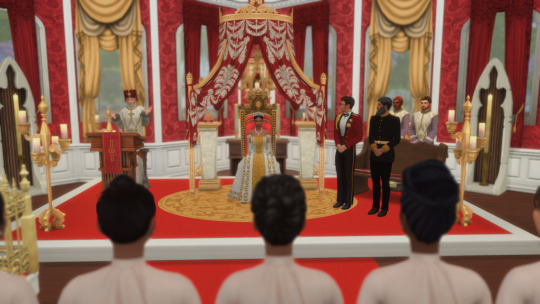
Ceremonies
There are a few ceremonies that fall within the religion - Marriages, Funerals, Coronations, and Conversions.
For each ceremony, Eyes of Jacob must give the Jacob’s Trilogy of Praise. This praise is meant to give the ultimate blessing to any believing sim directly from The Watcher. The Trilogy of Praise includes three key blessings:
The Watcher’s Absolution which absolves sims of their sins so they can look forward without the past blocking their path.
The Watcher’s Touch which protects the sim from dangers and obstacles.
The Watcher’s Blessing which is meant to fill the sims’ heart with the Watcher’s love and cherish thee. If a sim is given this praise at their funeral or just before death, they are said to live forever in eternal bliss.
For Conversions, a sim can convert at any time in life. They must meet with an Eye of Jacob and have a ceremony where they are given the Jacob’s Trilogy of Praise. Parents may also have the ceremony performed on their children.
Holidays
Significant Holidays that are celebrated within the faith include:
Winterfest which is at the end of December. It is said that Jacob traveled back from Yacothia during this time with a mission to spread the knowledge of The Watcher with the rest of the world. He endured many obstacles but his belief and fear of The Watcher protected him on his journey. During this holiday, Sims share gifts as Jacob shared the gift of knowing The Watcher.
Harvest Fest celebrated in November is when Sims gather around a large feast as Jacob did when he finally returned home to Yacothia. It is said that The Watcher blessed the meal because Jacob was so strong in his faith and spread the message with the world.
Ybtirten is an 8 day celebration in February of The Watcher practiced by the most faithful. Traditions include: Fasting for 8 days as Jacob did during his journey spreading the Word of The Watcher, converting sims to Jacobanism, proclaiming love and respect for The Watcher, and doing acts of kindness such as donating to the church or otherwise. It’s common to acquire “Watched Water” during this time from the Church of Jacob to absolve sins.
Well there it is! Let me know if there is anything else you would like me to talk about regarding Jacobanism. Please feel free to use this made-up religion in your stories, if you’d like and adapt it to your story as you see fit!
23 notes
·
View notes
Photo

Reporter: Welcome! I’m your host, Maria May with S Entertainment!, and tonight we will be exploring the Plight of the Pendite. We’ll dive back into history to see how SimDonia got to where it is today, how Penditism has evolved, and how this effects SimDonian Royals today.

Maria: The story of the Pendites starts many years ago with the infamous Goth Family. The land that is now considered SimDonia used to be called Pendula View and was in a bitter dictatorship ran by the Goth Dynasty. Known as Pendites, the citizens of the country were under strict rule.


Simon: Pendula View started off as a pretty thriving country. People didn’t have much, but they were happy. Common jobs were many farmers, locksmiths, general store or tavern owners. People of Pendula View had a real sense of community and pride. Even during the start of the Goth reign, Pendites never wavered on just being who they were at the core. Hard-working people with good values.

Simon: The problems really started when Jacobanism was starting to be introduced to Pendula View. People started learning more about the religion and listening to its teachings of fearing the watcher. Well, that didn’t really sit well with the goths. In Mortimer’s mind especially, the only person to fear was him. That’s when things in Pendula View really started to deteriorate.

Simon: The Goths had to have started feeling threathened by the introduction of Jacobanism. The only way they felt that they could maintain control was to inflict more fear into the Pendites.
Maria: The Goths began creating harsh laws that governed the people of Pendula View. Soon, guards were roaming the land, taxes went up, curfews were put in place, and anything even remotely Jacoban was banned or citizens would face harsh punishment. But, it wasn’t enough for the Goths to make their own people fear them, they wanted surrounding countries to fear them, as well. That’s when the wars started that plagued the region with low morale and poverty.

Maria: The Goths conquered neighboring country, Sage Estates. For the dynasty, this served as a huge win. But, for the people of Pendula View, this was the beginning of a revolution. But first, a word from our sponsers.
Commercial Break

Bailey Kay: Are you thirsty? Then you need JUICE. Try their brand new flavors of bubbly drinks - orange and green tea! It’s Bold. Bubbly. Brisk.

Actor: What happens when two ambassadors from opposite sides of a bitter war come together for more than peace treaties? “Foreign Affairs” is #1 on the Hallow Slough Best-Seller List. Critics call it “Story of the Year,” “A Romance Story for the Ages,” and “A Must Read!” Grab your copy at all local and national book stores. Audiobook version available online now!

Actor: Starring Nick Wilkinson, “Apocalypse Rising” is the breakout action film everyone has been talking about! This dystopian thriller will leave you on the edge of your seat! Catch it at your local moval theater Summer Week 1.
End of Commercial Break
{The post is long so the rest is under the cut! TW: FIRE, Mention of Execution.}

Maria: Welcome back to “The Plight of the Pendite.” I’m your host, Maria May with S Entertainment! When we left off the Pendites were coming to terms with a stricter Goth Regime. While some citizens if Pendula View were lost and simply dealing with their struggles, others were ready to take matters into their own hands.

Nicole: We know William Winston ll as our first King, but in Pendula View, he was William Smith, a local locksmith and aspiring soldier. He sustained multiple injuries from locksmithing, which led to frequently rejections from the military. But, he made a comfortable living as a locksmith. His friend, Bob Pancake, owned the general store that was struggling due to higher taxation.

Nicole: Queen Ophelia at the time was Ophelia Collette who was the daughter of the local tavern owner. Her passion was singing, so she sang at the tavern in the evenings when she wasn’t working. When she met William one night at the tavern, she was fascinated by his ideals and plans to overthrow the Goth family. Her father’s tavern was among the businesses that were struggling to keep up with the higher taxes. They were soon married and she was instrumental in supporting William and his quest for freedom.

Maria: William recruited and planned day in and day out. Of course, there were Pendites who didn’t want to rock the boat, especially with fear of execution on the line. But, many wanted to fight as life got more unbearable in Pendula View.
Simon: I believe it was a very concious decision to go after the Palace. Here we have people falling ever so rapidly into poverty. Many people were starving which led to more crime throughout Pendula View. But, then you have this shining and secure palace that’s the Goths made them believe was untouchable. Well the night the revolutionists paid a visit, it certainly was not.

Maria: The Pendites who were apart of the revolution had more than just anger and gumption on their side. They also had an ally on the inside. Cassandra Goth, daughter of the dictators, was secretly helping. She helped the revolutionists get inside of the Goth home, which is how they were able to set the palace on fire and execute Mortimer and Bella Goth.

Nicole: People know of Cassandra as the first female Prime Minister and the hero she was during The War of Existence, but we don’t always talk about the trauma she had to go through. She was just a teen at the time. But in an interview once, she mentioned that her parents would force her to go to these extravagent masquerade balls to parade her around for an arranged marriage she didn’t want. She would hide out in the kitchen with the wait staff and talk to them about their life. That’s how she learned how impoverished Pendula View was and she felt awful dressing up in fancy gowns and jewelry when so many people were suffering.

Maria: With the Goth family gone, the liberated nation looked to William for a leader. The region was named SimDonia, a monarchy was established, and Bob Pancakes served as the first Prime Minister under HM King William who chose Winston as his regal name.
Nicole: King William is so highly regarded and not just because he helped found SimDonia and set up the nation we’ve grown to love today, but he really cared about the people - all the people. While he eventually stopped referring to himself as a Pendite and instead a SimDonian, he embraced citizens who wanted to still identify with Penditism. Many people had fond memories and a deep connection to Penditism before the revolution. Really, we all came from a Pendite. It’s at the core of who we are as SimDonians.

Maria: Over the years, the identified Pendites population has died down in SimDonia as more people identify as solely SimDonians. While positive organizations like the National Association of Pendites have been created to preserve the precious history and customs, extreme Penditism has gained momentum, as well. As we saw with the museum fire that took place, the extremists do not want to simply embrace Penditism, but to go back to the brutish cultire of the Goth Dynasty. Many believe this is why King Spencer decided to go to war to show that he was on the side of Pendites. But, this is not the side of Penditism that most citizens identify with.

Nicole: While addressing domestic terrorism is important, there is a fine line that shouldn’t be crossed especially by our government. Penditism isn’t a disease that needs to be treated and thrown out, it’s a culture and a history. That is why HM King Spencer’s initial denouncement was so damaging. People who identify as Pendites deserve respect and should not be regarded as terrorists or violent or any other slander they have faced in this country. If we cannot count on our leaders to handle this properly, perhaps we need new leaders.

Maria: The plight for Pendites is certainly not over. The monarchy continues to try to mend it’s relationship with Pendites, but it’s clear that trust has been severely broken. Only time will tell how the relationship will be amended. Perhaps the answer is in our current leadership or perhaps can be found elsewhere. Only time will tell. My name is Maria May with S Entertainment! Thank you for watching.
#simdonia#chap 7#sims of color#sims 4 story#sims 4 gameplay#ts4#royal sims#royal simblr#man I know this long#but is the best history of SimDonia you can get! lol#I'm so proud of this post!#let me know if anything needs clarification!#worldbuilding#sim: spencer#sim: king william#sim: queen ophelia#sim: goths#sim: cassandra goth
92 notes
·
View notes
Photo


Winston Royal Jacoban Church | Parkshore, SimDonia
???: Your Royal Highness, it’s wonderful to see you. Thank you for coming.
Bria: No, thank you seeing me, I know you’re a busy man.

Eye of Jacob: I’m never to busy for those seeking answers. Please have a seat.
Bria: Thank you. I am definitely seeking answers because I have one million questions.
Eye of Jacob: Please, feel free to ask.

Bria: Well, I talked to another Eye of Jacob at HM’s wedding and they told me I need to “find the faith” in my heart. But, like, how does that work? How can I find faith in something that I know nothing about?
Eye of Jacob: I see. You’re the type of believer who needs a little reason to go along with her faith.
Bria: Is that a bad thing?

Eye of Jacob: I don’t believe so. It’s easy to blindly believe in something that you’re taught from the very beginning. But, to seek out your own beliefs means you must have a powerful calling. Perhaps fueled by love, if you don’t mind my saying?
Bria: Wow, you’re good. Yes, I want to learn more about my husband and now my country’s faith. But, I also want to... believe in something, as well. A higher power. I guess I just need a better understanding.
Eye of Jacob: Well, I certainly want to help. How much do you know about Jacob?
Bria: Not much at all, really? He founded the religion?

Eye of Jacob: Correct. Jacob who was born in Yacothia, or the Holy City. Jacob was chosen by the Watcher, the creator of us all. The Watcher spoke through him to teach us how we should live our lives. That is how Jacobanism was born.
Bria: So, we just believe this guy...?
Eye of Jacob: Yes. Faith, Your Royal Highness, Faith.
Bria: Okay, okay. And we’re meant to live our lives in fear?
Eye of Jacob: We are meant to fear the Watcher, not fear life. The Watcher is merciful to those who submit to the moral code to live a better life.

Bria: I see... well there is a lot of talk about what happens if you don’t follow the Watcher. But, what if you do? Is your life better?
Eye of Jacob: Oh, absolutely. The Watcher will absolve you of your sins, protect you, and bless you and your family. This is why people have faith. They want to know that a higher power looks out for their well-being.
Bria: Okay, that makes sense.

Eye of Jacob: Good. Your Royal Highness, I would love to help you continue your path towards faith. Please, take this Book of Jacob for reading. Also, I’d love to have you and your family here for a service soon.
Bria: Thank you. I think that would be really good for me and the girls. I really appreciate your help.
Eye of Jacob: I’m happy to serve you, Your Royal Highness, as is my mission.

#simdonia#chap 9#sims of color#sims 4 gameplay#sims 4 story#ts4#royal sims#royal simblr#if Bria is going to do anything she's going to ask questions lol#religion tw#sim: bria
28 notes
·
View notes